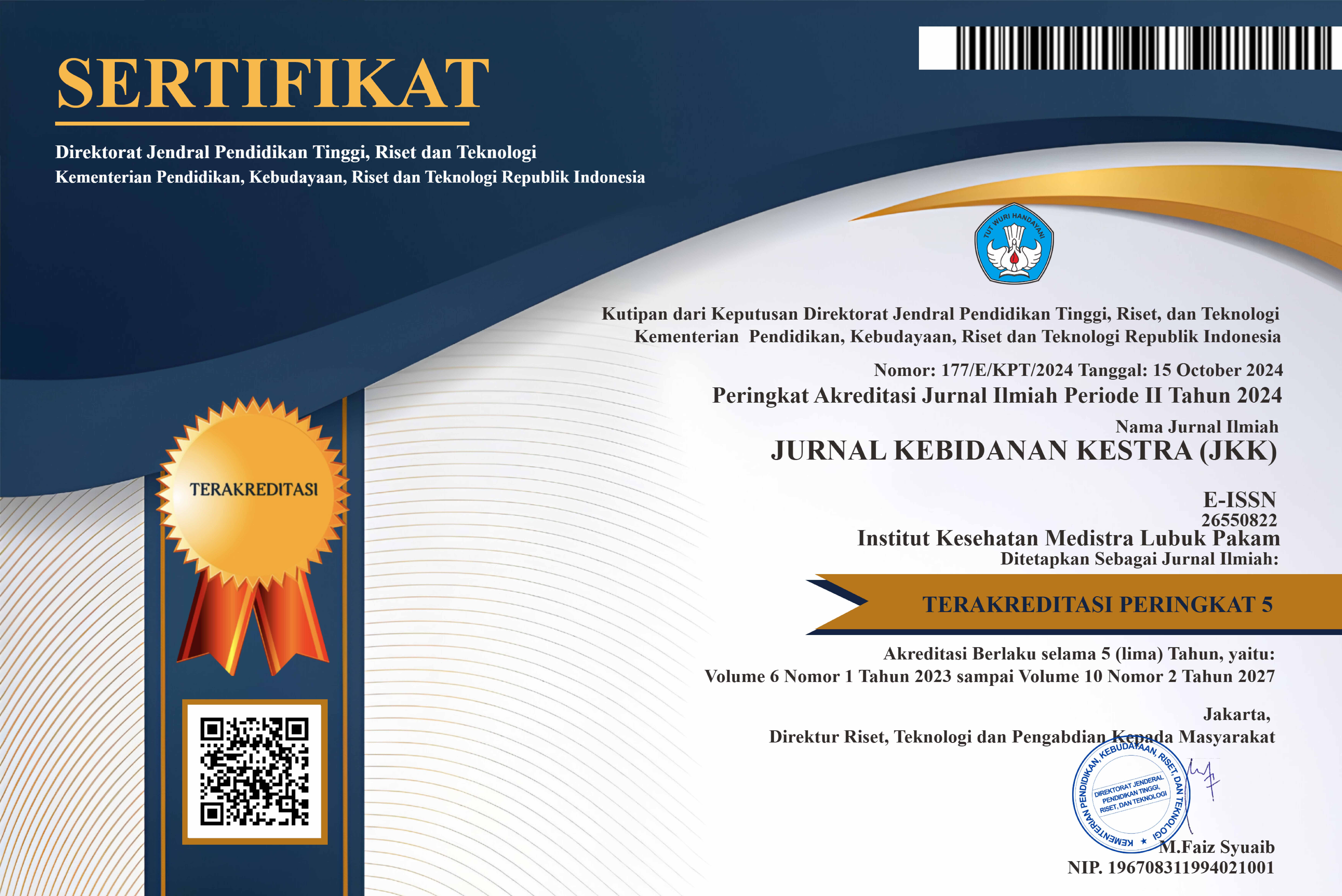Effect of Inhaled Oil Aromatherapy on Emesis Gravidarum in First Trimester Pregnant Women
DOI:
https://doi.org/10.35451/jkk.v5i1.1420Keywords:
Emesis Gravidarum, Peppermint AromatherapyAbstract
Emesis Gravidarum (nausea and vomiting) is a common complaint in early pregnancy due to increased production of the hormones estrogen, progesterone, and placental human chorionic gonadotrophs. Peppermint aromatherapy is a therapeutic measure to treat emesis gravidarum in pregnant women. This aromatherapy has a cool, refreshing, and makes you feel comfortable. This study aims to find out how to give inhaled peppermint oil aromatherapy that can affect emesis gravidarum in first trimester pregnant women. The research method used is a literature study where an analysis of journals and articles with a review of existing theories is carried out.The journals that have been reviewed are as many as 16 journals. The results of this study revealed that the content of peppermint that can overcome emesis gravidarum is methhol and methone. The amount of peppermint is given 2-3 drops of peppermint essential oil on a tissue with a distance of 3-5 cm and inhaled for 5-10 minutes by doing 2 times a day in the morning and evening. From the results of the study that there are differences in the effectiveness of peppermint aromatherapy with other aromatherapy, where peppermint oil aromatherapy is more effective in overcoming nausea and vomiting in first trimester pregnant women. Health workers, especially midwives, can provide peppermint aromatherapy care to reduce emesis gravidarum in first trimester pregnant women.
Downloads
References
Afriyanti, Detty. (2017). Efektivitas Wedang Jahe Dan Daun Mint Untuk Mengurangi Mual Muntah Pada Ibu Hamil di PMB YF Kota Bukittinggi Tahun 2017. Jurnal Human Care, 2(3), 1-11. Retrieved from https://ojs.fdk.ac.id/index.php/humancare/article/view/642
Amilia, R. (2019). Efektifitas Aromaterapi Pepermint Inhalasi Terhadap Mual Dan Muntah Ibu Hamil Trimester I Di Puskesmas Yogyakarta. Skripsi. Universitas 'Aisyiyah Yogyakarta. Retrieved from http://digilib.unisayogya.ac.id/4447/
Astuti, W., Heni, S., Esti & Kartika, W. (2015). Pengaruh Aromaterapi Bitter Orange Terhadap Nyeri Dan Kecemasan Fase Aktif Kala 1. Proceedings The 2nd University Research Coloquium 2015, 371-382. Retrieved from https://jurnal.unimus.ac.id/index.php/psn12012010/article/view/1613/1665
Dinas Kesehatan Provinsi Sumatera Selatan. (2015). Profil Dinas Kesehatan Provinsi Sumatera Selatan tahun 2015. Sumatera Selatan.
Kartikasari, R. I., Faizatul, U., Lutfi, B. T. (2017). Aromaterapi Pappermint Untuk Menurunkan Mual Dan Muntah Pada Ibu Hamil. Surya, 9(2), 1-7. Retrieved from http://lppm.umla.ac.id/wp-content/uploads/2020/09/37-43-Ratih-Indah-Kartikasari.pdf
Khadijah, S. R., Nurul, H. L., Dewi, K. (2020). Perbedaan Efektivitas Pemberian Aromaterapi Lemon Dan Aromaterapi Peppermint Terhadap Ibu Hamil Dengan Mual Muntah Trimester I Di Bpm Nina Marlina Bogor, Jawa Barat, Tahun 2020. Jurnal Health Sains, 1(2), 76-86. Retrieved from https://jurnal.healthsains.co.id/index.php/jhs/article/view/22
Lubis, R., Sonya, E., Yusniar, S. (2019). Pemberian Aromaterapi Minyak Peppermint Secara Inhalasi Berpengaruh Terhadap Penurunan Mual Muntah Pada Ibu Hamil Di Pmb Linda Silalahi Pancur Batu Tahun 2019. Colostrum Jurnal Kebidanan, 1(1), 1-10. Retrieved from http://ojs.poltekkes-medan.ac.id/colostrum/article/view/599
Nuryanti, S., Rusmiyati & Elisa. (2015). Efektifitas Aromaterapi Inhalasi Peppermint Dan Ingesti Lemon Terhadap Penurunan Mual Pada Ibu Hamil Trimester Pertama Di Bpm Ny.Marminah Purwodadi. Jurnal Ilmu Keperawatan dan Kebidanan (JIKK), 5 (1), 1-11. Retrieved from http://ejournal.stikestelogorejo.ac.id/index.php/ilmukeperawatan/article/view/504
Pujiastuti, E. (2014). Pengaruh Ekstrak Rimpang Jahe Merah (Zingiber officinale var. Rubrum) Terhadap Perkembangan Embrio Praimplantasi Mencit (Mus musculus) Swiss Webster. Skripsi. Program Studi Biologi Fakultas Pendidikan Matematika dan Ilmu Pengetahuan Alam Universitas Pendidikan Indonesia. Retrieved from http://repository.upi.edu/15114/
Putri, S. S., Nurul, I.,& Ike, A. Y. (2020). The effect of mint oil on nausea and vomiting during pregnancy. Malahayati International Journal of Nursing and Health Science, 3(1), 35-39. Retrieved from http://ejurnalmalahayati.ac.id/index.php/nursing/article/view/2855/pdf
Rahayuningsih, Utik. (2020). Efektifitas Pemberian Aromaterapi Peppermint Dengan Masalah Mual Dan Muntah Pada Ibu Hamil Trimester I Di Kelurahan Sukoharjo. Indonesian Journal on medical science, 7(2), 169-176. Retrieved from http://ejournal.poltekkesbhaktimulia.ac.id/index.php/ijms/article/view/245
Santi, D. R . (2013). Pengaruh Aromaterapi Blended Peppermint dan Ginger Oil terhadap Rasa Mual pada Ibu Hamil Trimester Satu di Puskesmas Rengel Kabupaten Tuban. Sain Med. 5(2). hal 52-55.Retrieved from https://www.kopertis7.go.id/uploadjurnal/Dwi_Rukma_Santi_stikes_nu_tuban.pdf
Wulandari, Siswi. (2020). Pengaruh Pemberian Air Rebusan Daun Mint Terhadap Frekuensi Emesis Pada Ibu Hamil Trimester I. Jurnal Kebidanan Kestra (JKK). 3(1). HAL 61-66. Retrieved from https://ejournal.medistra.ac.id/index.php/JKK/article/view/501/244
Yantina, Yuli. (2016). Pengaruh Pemberian Essensial Oil Peppermint Terhadap Intensitas Mual Dan Muntah Pada Ibu Hamil Trimester I Di Desa Way Harong Timur Kecamatan Way Lima Kabupaten Pesawaran Tahun 2016. Jurnal Kebidanan Malahayati, 2(4), 194-199. Retrieved from http://ejurnalmalahayati.ac.id/index.php/kebidanan/article/view/593/527
Zuraida, & Elsa, D. S. (2018). Perbedaan Efektivitas Pemberian Essensial Oil Peppermint dan Aroma Terapi Lavender terhadap Intensitas Mual dan Muntah pada Ibu Hamil Trimester I di Puskesmas Baso Kabupaten Agam Tahun 2017. Menara Ilmu, 12(4) 142-151. Retrieved from https://jurnal.umsb.ac.id/index.php/menarailmu/article/view/745/664
Downloads
Published
Issue
Section
License
Copyright in each article is the property of the Author.



























